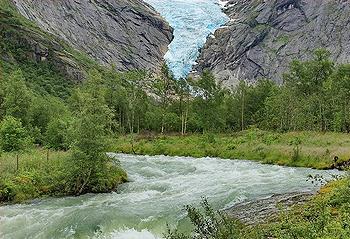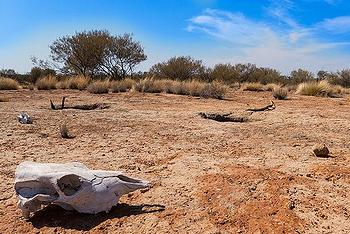 |
| Reviews and Templates for Expression We |
Leaked UN Report Predicts ‘Irreversible’ Climate Change
“Many aspects of climate change will persist for centuries even if concentrations of greenhouse gases are stabilised. This represents a substantial multi-century commitment created by human activities today,” states the draft report by the UN’s Intergovernmental Panel on Climate Change.

Glacier melting at Briksdalsbre, Sogn og Fjordane Fylke, Norway, June 2011 (Photo by Edward Neyburg)
“For scenarios driven by carbon dioxide alone, global average temperature is projected to remain approximately constant for many centuries following a complete cessation of emissions,” the draft states. “Thus a large fraction of climate change is largely irreversible on human time scales, except if net anthropogenic greenhouse gas emissions were strongly negative over a sustained period.”
“More comprehensive and improved observations strengthen the evidence that the ice sheets are losing mass, glaciers are shrinking globally, sea ice cover is reducing in the Arctic, and snow cover is decreasing and permafrost is thawing in the Northern Hemisphere,” states the draft.
Blogger Alec Rawls leaked the draft on his website: www.stopgreensuicide.com.
The leaked document, is part of the IPCC’s Fifth Assessment Report. It is formally titled, “The Second Order Draft of the Working Group I contribution to the Intergovernmental Panel on Climate Change (IPCC) Fifth Assessment Report Climate Change 2013: The Physical Science Basis.”
Rawls, a climate skeptic and an official “expert” reviewer of the assessment, said he regards his confidentiality agreement with the UN’s IPCC as “vitiated by the systematic dishonesty of the report.”
Rawls’ complaint focuses on climate forcings, the initial drivers of a climate shift. Solar irradiance is one example of a forcing, greenhouse gas concentrations in the atmosphere are another.
Rawls complains that he “can have no confidence” in the IPCC authors’ conclusion that “natural forcing is small compared to anthropogenic [human] forcing.”
Based on this lack of confidence, Rawls writes, “I believe that the leaking of this draft is entirely legal, that the taxpayer funded report is properly in the public domain under the Freedom of Information Act, and that making it available to the public is in any case protected by established legal and ethical standards…”
The IPCC said in a statement today that it “regrets his unauthorized posting which interferes with the process of assessment and review.” The IPCC declined to comment on the contents of this and all draft reports, “as they are works in progress.”
The IPCC report is scheduled for publication in three parts starting in September 2013. A final summary due in October 2014 will complete publication of the assessment.
It is intended to inform negotiators from 194 countries who are writing a new global climate treaty that governments have agreed will be adopted by 2015 and take effect by 2020.
More than 800 authors from around the world are involved in writing the IPCC’s Fifth Assessment Report, which follows four previous assessments, issued in 1990, 1995, 2001, and, most recently, in 2007.
The IPCC said, “It should also be noted that the cut-off date for peer-reviewed published literature to be included and assessed in the final draft lies in the future (15 March 2013). The text that has been posted is thus not the final report. This is why the IPCC drafts are not made public before the final document is approved.”
That said, the preliminary conclusions in the leaked draft are alarming.
“Assessment Report 4 concluded that warming of the climate system is unequivocal. New observations, longer data sets, and more paleoclimate information give further support for this conclusion. Confidence is stronger that many changes, that are observed consistently across components of the climate system, are significant, unusual or unprecedented on time scales of decades to many hundreds of thousands of years,” the draft states.
“Globally averaged near surface temperatures have increased since the beginning of the 20th century and the warming has been particularly marked since the 1970s. Each of the last three decades has been significantly warmer than all preceding decades since 1850,” says another conclusion.
“Based on independent observational systems and datasets, and their agreement, it is virtually certain that the upper ocean has warmed since 1971, and that ocean warming dominates the change in the global energy content,” according to the draft.
|
|
|
|
Copyright 2011 Energy and Technical Services Ltd. All Rights Reserved. Energyts.com |

